List of rulers of Bohemia
From Wikipedia, the free encyclopedia
| Monarchy of Bohemia | |
|---|---|
| Former Monarchy | |
 | |
| Royal Coat of arms | |
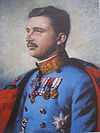 | |
| Charles III | |
| First monarch | Bořivoj I (as Duke) |
| Last monarch | Charles III (as King) |
| Style | His Majesty |
| Official residence | Prague Castle |
| Appointer | Hereditary |
| Monarchy began | c. 870 |
| Monarchy ended | 14 November 1918 |
| Current pretender(s) | Karl von Habsburg |
This is a list of rulers of Bohemia who ruled the country first as dukes and later as kings from the 9th century until 1918. Bohemia, from the 14th century the Lands of the Bohemian Crown, became part of the Czechoslovak Republic in 1918 and since 1993 is known as the Czech Republic.
Princes of Great Moravia
- Mojmír I (833–846)
- Rastislav (846–870)
- Slavomír (871) (interim)
- Svatopluk I (871–894)
- Mojmír II (894–906?)
Legendary rulers of Bohemia
- Praotec Čech (Pater Boemus)
- Krok
- Libuše, duchess; Přemysl, the Ploughman, her husband.
- Nezamysl
- Mnata
- Vojen
- Vnislav
- Křesomysl
- Neklan
- Hostivít
Dukes of Bohemia (c. 870–1198)
| Dukes of Bohemia | |||
| House of Přemyslid | |||
| Image | Name | Date | Notes |
 |
Bořivoj I | c. 870–888/9 | |
 |
Spytihněv I | 894–915 | Son of Bořivoj I. |
 |
Vratislaus I (Vratislav) |
915–921 | Brother of Spytihněv I. |
 |
Wenceslaus I (Václav) |
921–935 | Son of Vratislaus I; known as St. Wenceslaus ("Good King Wenceslas" for English speaking people), the patron saint of the Czech lands. |
 |
Boleslaus I the Cruel (Boleslav I. Ukrutný) |
935–972 | Brother of Wenceslaus I. |
 |
Boleslaus II the Pious (Boleslav II. Pobožný) |
972–999 | Son of Boleslaus I. |
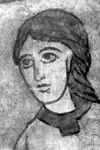 |
Boleslaus III the Redhead (Boleslav III. Ryšavý) |
999–1002 | Son of Boleslaus II. |
| Vladivoj | 1002–1003 | Of the Piast dynasty (?). Said to be first cousin of Boleslav III. Polish name Władywoj. | |
 |
Boleslaus III | 1003 | Second time. |
 |
Boleslaus the Brave (Boleslav Chrabrý) |
1003–1004 | Member of the Piast dynasty; brother of Vladivoj (?), grandson of Boleslaus I. Duke and later king of Poland. |
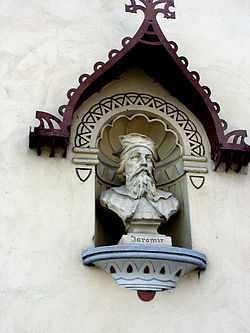 |
Jaromír | 1004–1012 | Brother of Boleslaus III. |
 |
Oldřich | 1012–1033 | Brother of Jaromír. |
 |
Jaromír | 1033–1034 | Second time. |
 |
Oldřich | 1034 | Second time. |
 |
Bretislaus I (Břetislav I.) | 1034–1055 | Son of Oldřich |
 |
Spytihněv II | 1055–1061 | Son of Bretislaus I. |
 |
Vratislaus II (Vratislav II.) |
1061–1092 | Brother of Spytihněv II. King 1085–1092 as Vratislaus I. |
 |
Conrad I (Konrád I. Brněnský) |
1092 | Brother of Vratislavus II. |
 |
Bretislaus II (Břetislav II.) |
1092–1100 | Nephew of Conrad I, son of Vratislav II. |
 |
Bořivoj II | 1101–1107 | Brother of Bretislaus II. |
 |
Svatopluk (Svatopluk Olomoucký) |
1107–1109 | First cousin of Bořivoj II. |
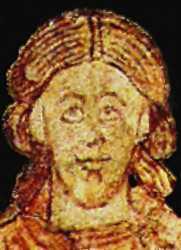 |
Vladislaus I (Vladislav I.) | 1109–1117 | Brother of Bořivoj II. |
 |
Bořivoj II | 1117–1120 | Second time |
 |
Vladislaus I | 1120–1125 | Second time |
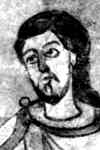 |
Soběslav I | 1125–1140 | Brother of Vladislaus I. |
| Vladislaus II (Vladislav II.) |
1140–1172 | Nephew of Sobeslaus I, son of Duke Vladislaus I. King 1158–1172 as Vladislaus I. | |
 |
Frederick (Bedřich) | 1172–1173 | Son of Vladislaus II. |
| Soběslav II | 1173–1178 | First cousin once removed of Frederick, Son of Sobeslaus I. | |
 |
Frederick | 1178–1189 | Second time. |
 |
Conrad II Otto (Konrád II. Ota) |
1189–1191 | Descendant of Conrad I. |
| Wenceslaus II (Václav II.) |
1191–1192 | Brother of Sobeslaus II. | |
 |
Ottokar I (Přemysl I. Otakar) | 1192–1193 | Son of Vladislaus II. |
| Henry Bretislaus (Jindřich Břetislav) |
1193–1197 | First cousin of Ottokar I. | |
 |
Vladislaus Henry (Vladislav Jindřich) |
1197 | Brother of Ottokar I. |
 |
Ottokar I | 1197–1198 | Second time. Became king in 1198, and his descendants retained the title. |
Kings of Bohemia (1198–1918)
| Kings of Bohemia | |||
| House of Přemyslid | |||
| Image | Name | Date | Notes |
 |
Ottokar I (Přemysl I. Otakar) |
1198–1230 | Hereditary royal title approved by King Philip of Germany, confirmed by the 1212 Golden Bull of Sicily |
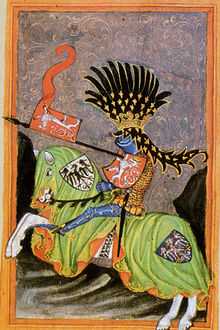 |
Wenceslaus I (Václav I.) |
1230–1253 | Son of Ottokar I. |
 |
Ottokar II (Přemysl II. Otakar) |
1253–1278 | Son of Wenceslaus I. Also Duke of Austria, Duke of Styria, Duke of Carinthia and Duke of Carniola. |
 |
Wenceslaus II (Václav II.) |
1278–1305 | Son of Ottokar II. Also Duke of Kraków (from 1291) and King of Poland (1300–1305). |
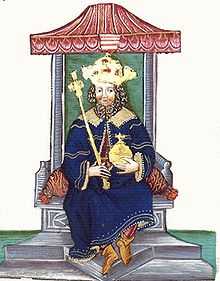 |
Wenceslaus III (Václav III.) |
1305–1306 | Son of Wenceslaus II. Uncrowned (as Bohemian king). Also King of Hungary and King of Poland. |
| Non-Dynastic | |||
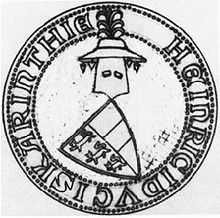 |
Henry the Carinthian (Jindřich Korutanský) |
1306 | Meinhardiner. Son-in-law of Wenceslaus II. Non-crowned. |
 |
Rudolph I (Rudolf I.) |
1306–1307 | Habsburg. Second husband of Elisabeth Richeza of Poland, widow of Wenceslaus II. Non-crowned. |
 |
Henry the Carinthian | 1307–1310 | Second time |
| House of Luxembourg | |||
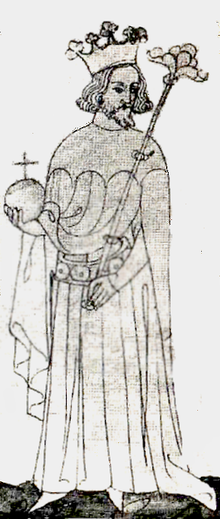 |
John the Blind (Jan Lucemburský) |
1310–1346 | Son-in-law of Wenceslaus II. |
 |
Charles I (Karel I.) |
1346–1378 | Son of John. Also Holy Roman Emperor as Charles IV. |
 |
Wenceslaus IV (Václav IV.) |
1378–1419 | Son of Charles IV. Also King of the Romans until 1400. |
 |
Sigismund (Zikmund) |
1419–1437 | Brother of Wenceslaus IV. Ruled effective 1436–1437 only (because of the Hussite Revolution). Also Holy Roman Emperor and King of Hungary. |
| House of Habsburg | |||
 |
Albert (Albrecht Habsburský) |
1437–1439 | Son-in-law of Sigismund. Also King of the Romans and of Hungary. |
| Interregnum | 1440–1453 | The succession of Albert's son was not recognized by the Czech nobility for the most of this era; the land was administered by the landfriedens (provincial & territorial). | |
 |
Ladislaus the Posthumous (Ladislav Pohrobek) |
1453–1457 | Son of Albert born after his father's death. Also King of Hungary. |
| Non-Dynastic | |||
 |
George of Podebrady (Jiří z Poděbrad) |
1457–1471 | Elected king from the Czech noble family House of Kunštát. Although he had descendants, the succession devolved to the prince from Polish kingdom. |
 |
Matthias Corvinus (Matyáš Korvín) |
1469–1490 | King of Hungary, elected by the insurgent Catholic Czech aristocrats as antiking in 1469, but never crowned. In 1479, he agreed to limit his rule to Moravia, Silesia, and Lusatia, while retaining his title. |
| House of Jagiellon | |||
 |
Vladislaus II the Jagiellonian (Vladislav II. Jagellonský) |
1471–1516 | Nephew of Ladislaus the Posthumous; elected on request of his predecessor George. Also King of Hungary after 1490. |
 |
Louis the Jagiellonian (Ludvík Jagellonský) |
1516–1526 | Son of Vladislaus II. Also King of Hungary. |
| House of Habsburg | |||
_-_Emperor_Ferdinand_I_-_WGA02326.jpg) |
Ferdinand I | 1526–1564 | Brother-in-law of Louis; elected king. Also King of Hungary and Holy Roman Emperor-elect from 1558. |
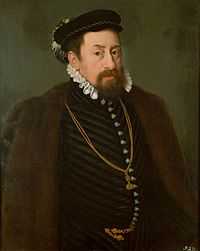 |
Maximilian I (Maxmilián I.) |
1564–1576 | Son of Ferdinand I, grandson of Vladislaus II. Also King of Hungary and Holy Roman Emperor. |
 |
Rudolph II (Rudolf II.) |
1576–1611 | Son of Maximilian I. Also King of Hungary and Holy Roman Emperor. |
 |
Mathias (Matyáš) |
1611–1619 | Brother of Rudolph II. Also King of Hungary and Holy Roman Emperor. |
 |
Ferdinand II | 1619–1637 | Nephew of Matthias. Also King of Hungary and Holy Roman Emperor. |
 |
Frederick I | 1619–1620 | Member of the House of Wittelsbach. Elected by the Crown's Estates at the beginning of the Thirty Years' War but after the lost Battle of White Mountain he fled the country. |
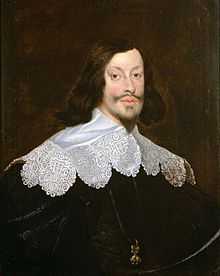 |
Ferdinand III | 1627–1657 | Son of Ferdinand II. Also King of Hungary and Holy Roman Emperor. |
.jpg) |
Ferdinand IV | 1646–1654 | Son of Ferdinand III. Junior co-monarch during his father's reign. Also King of Hungary and King of the Romans. |
 |
Leopold I | 1657–1705 | Brother of Ferdinand IV. Also King of Hungary and Holy Roman Emperor. |
 |
Joseph I (Josef I.) |
1705–1711 | Son of Leopold I. Also King of Hungary and Holy Roman Emperor. |
 |
Charles II (Karel II.) |
1711–1740 | Brother of Joseph I. Also King of Hungary and Holy Roman Emperor as Charles VI. |
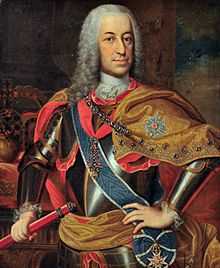 |
Charles Albert (Karel Albrecht) |
1741–1743 | Member of the House of Wittelsbach. Son-in-law of Joseph I. Antiking to Maria Theresa during the War of the Austrian Succession. Also Holy Roman Emperor as Charles VII. |
.jpg) |
Maria Theresa (Marie Terezie) |
1740–1780 | Daughter of Charles II. Also Queen of Hungary. |
| House of Habsburg-Lorraine | |||
 |
Joseph II (Josef II.) |
1780–1790 | Son of Maria Theresa. Also King of Hungary and Holy Roman Emperor. |
.png) |
Leopold II | 1790–1792 | Brother of Joseph II. Also King of Hungary and Holy Roman Emperor. |
 |
Francis I (František I.) |
1792–1835 | Son of Leopold II. Also King of Hungary, Holy Roman Emperor to 1806, Emperor of Austria from 1804. |
 |
Ferdinand V | 1835–1848 | Son of Francis I. Also Emperor of Austria and King of Hungary. Last crowned King of Bohemia. Forced to abdicate diring the Revolution of 1848. |
 |
Francis Joseph I (František Josef I.) |
1848–1916 | Nephew of Ferdinand V. Also Emperor of Austria and King of Hungary. |
 |
Charles III (Karel III.) |
1916–1918 | Grandnephew of Francis Joseph I. Also Emperor of Austria and King of Hungary. Ruled briefly during World War I, in November 1918 renounced participation in state affairs but did not abdicate. |
See also
| |||||||||||||||||||||||||||||||||||||||||||||||||||
This article is issued from Wikipedia. The text is available under the Creative Commons Attribution/Share Alike; additional terms may apply for the media files.